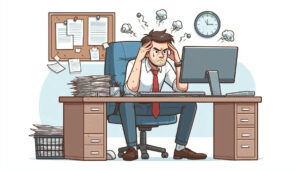How to Reduce Stress and Anxiety
Stress and anxiety have become frequent in today’s super fast world,
affecting almost every human being of all ages and backgrounds. Experiencing or facing
occasional stress is normal, however chronic stress and anxiety can
impact mental and physical well-being significantly. Fortunately, there are various
steps, strategies and techniques and Therapies that individuals can implement to alleviate stress
and anxiety and can experience a more balanced, calm and fulfilling life.
1. Introduction
It’s essential to grasp the fundamentals and essence of stress and anxiety to handle them effectively. Stress arises as the body’s natural reaction to perceived threats or pressures, setting off a series of physiological responses called the “fight or flight” response. Conversely, anxiety involves an excessive concern or fear regarding upcoming events, frequently coupled with physical symptoms like heightened heart rate and tense muscles.
2. Recognizing the Causes of Stress
 Understanding the elements that lead to stress and anxiety is the initial stride in effectively handling them. Typical stressors comprise work demands, financial worries, relationship tensions, and health issues. Furthermore, personal stressors like past traumas or unresolved conflicts can also play a role in one’s overall stress levels.
Understanding the elements that lead to stress and anxiety is the initial stride in effectively handling them. Typical stressors comprise work demands, financial worries, relationship tensions, and health issues. Furthermore, personal stressors like past traumas or unresolved conflicts can also play a role in one’s overall stress levels.
3.Methods to reduce Stress and Anxiety
– Deep Breathing Exercises
Engaging in deep breathing exercises, commonly referred to as diaphragmatic breathing, can aid in soothing the mind and invoking relaxation. By concentrating on slow, deep breaths, individuals can trigger the body’s relaxation response, which helps counteract the physiological impacts of stress.
– Mindfulness Meditation
Mindfulness meditation means focusing on the present moment without criticism, enabling individuals to develop awareness and acceptance of their thoughts and emotions. Consistent mindfulness meditation practice has resulted in diminishing stress, anxiety, and depressive symptoms.
– Physical Activity
Participating in regular or consistent physical activity offers another powerful method to relieve stress and anxiety. Exercise triggers the release of endorphins, neurotransmitters that strengthen sensations of well-being and joy. Whether it involves taking a stroll, engaging in yoga, or joining a team sport, discovering an activity you enjoy can deeply impact your mental well-being.
– Adequate Sleep
Making sleep a priority is crucial for effectively managing stress and anxiety. Inadequate sleep can worsen symptoms of stress and anxiety, making it challenging to handle daily tasks. Aim for seven to nine hours of quality sleep per night, and establish a calming bedtime routine to encourage restful sleep.
– Healthy Eating Habits
Keeping a balanced diet is crucial for your overall well-being and stress management. Refrain from consuming too much caffeine, alcohol, and processed foods, as they can worsen anxiety symptoms. Instead, concentrate on integrating whole foods like fruits, vegetables, lean proteins, and whole grains into your meals.
4. Creating a Supportive Environment
Establishing a support system consisting of family, friends, and colleagues can offer invaluable emotional assistance during periods of stress and anxiety. Feel free to reach out to loved ones for encouragement, guidance, or just a sympathetic ear. Moreover, seeking assistance from a therapist or counselor can provide tailored strategies for managing stress and anxiety.
5. Lifestyle Adjustments for Stress Management
– Time Management
Mastering time management skills can assist individuals in minimizing stress by prioritizing tasks, establishing achievable goals, and avoiding delays. Divide tasks into manageable steps and schedule time for both work and leisure to maintain a healthy work-life balance.
– Setting Realistic Goals
Establishing goals that are realistic and achievable can help in averting feelings of being overwhelmed and anxious. Divide larger goals into smaller, actionable steps, and acknowledge your progress as you move forward. Keep in mind that it’s okay to adapt your goals to accommodate changing circumstances.
– Prioritizing Self-Care
Engaging in self-care practices like pursuing hobbies, immersing yourself in nature, and using relaxation methods is crucial for sustaining emotional well-being. Prioritize self-care in your daily schedule, and don’t hesitate to allocate time for yourself to recharge and refresh without feeling guilty.
6. Conclusion
In summary, Reducing stress and anxiety demands a comprehensive approach that considers both the physical and psychological dimensions of these conditions. Through practicing techniques like deep breathing exercises, mindfulness meditation, consistent exercise, and establishing social support, individuals can effectively handle stress and anxiety, thereby enhancing their overall quality of life.